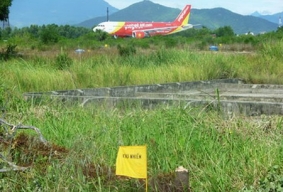
None of the subjects surveyed took part in the war or lived in areas which US forces sprayed with the toxic defoliant known as Agent Orange, but have been living for at least five years near the Da Nang airport, which was used by the US as an arsenal during the war, news website VnExpress reported.
A Vietnamese carrier lands at Da Nang airport. Words on the yellow flag indicate the area is contaminated with dioxin.
The project was sponsored by the Ford Foundation, Hatfield Consultants – a provider of quality environmental services in Canada.
Related government agencies said the project was conducted independently and it's not clear to them how such blood tests needed to take such a long period of time.
All subjects were at least 18 years of age.
Among the subjects were 18 people from one family.
One of them, Vo Duoc, 58, was shocked by the results.
He said his whole extended family is living around the area and all others might be affected as well.
“It would be a catastrophe for the children in my family.”
The blood samples were taken between 2006 and 2012 and the results have stirred panic among tens of thousands of people living in the area.
Nguyen Thi Hien, chairwoman of Da Nang Association of Victims of Agent Orange, said the results are “painful to both the project team and the society.”
But they would serve as evidence which would bolster and extend dioxin clean-up efforts, not only of the environment, but for its human victims as well, she said.
Like us on Facebook and scroll down to share your comment
The project will send 25 of the subjects to Vietnam Military Medical University in Hanoi where they will undergo dioxin clearance treatments next month. The treatment will be free of charge, the report said.
Doctor Nguyen Ba Vuong, from the university, said he and his colleagues will use the purification rundown method, also known as the Hubbard Method named for its founder, controversial American founder of the Church of Scientology, L. Ron Hubbard.
The treatment combines exercise, vitamin supplements and extended stays in a sauna.
It has been used successfully in Vietnam on several veterans, according to Dr. Vuong.
“It will surely work well on the new victims in Da Nang,” he said.
Da Nang airport is among three dioxin hotspots in Vietnam, together with the Bien Hoa Airport outside Ho Chi Minh City and the Phu Cat Airport in Binh Dinh Province in the south central region. The latter was officially removed from the list on August 18, after more than 7,000 cubic meters of dioxin-contaminated soil were safely removed and placed in a landfill.
The US Army sprayed some 80 million liters of Agent Orange containing 366 kilograms of the highly toxic dioxin over 30,000 square miles of southern Vietnam between 1961 and 1971.
Between 2.1 to 4.8 million Vietnamese citizens were directly exposed to Agent Orange and other chemicals that have been linked to cancers, birth defects and other chronic diseases during the Vietnam War that ended in April 1975.
Dioxin has represented a health hazard since the war because
of contamination of soil, through which it can enter the food
chain.
Scientists said dioxin is associated with some cancers and
respiratory illnesses.
The US-Vietnam Dialogue Group on Agent Orange/Dioxin estimates US$450 million is needed to eliminate dioxin hot spots and provide care, education and economic opportunities to those affected.
Source: thanhniennews.com






